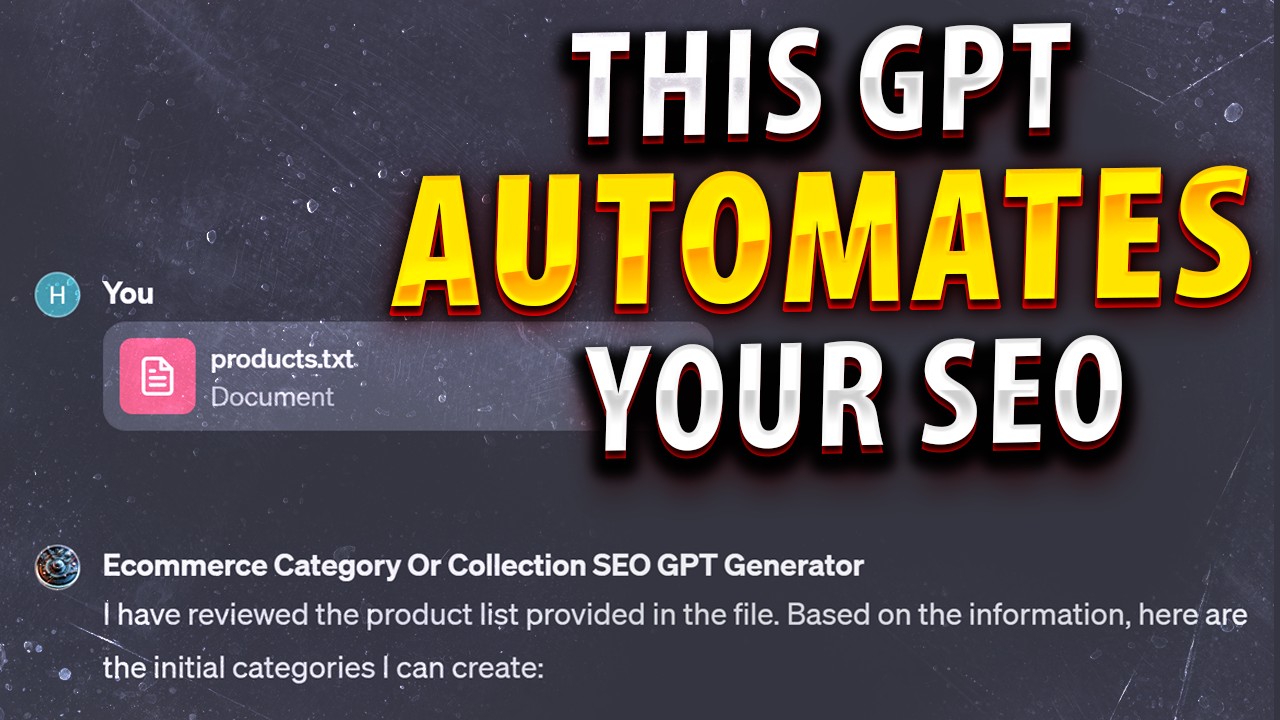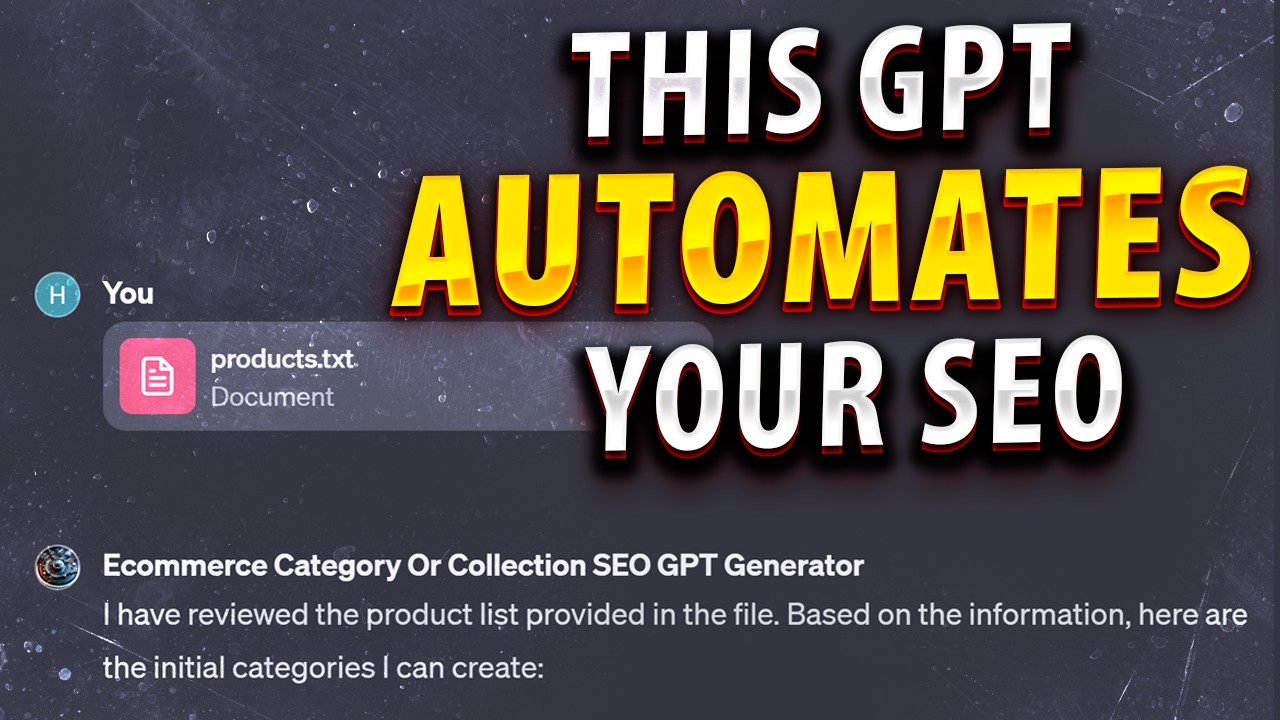Hey there! Have you ever wondered how to optimize your website for SEO? Well, look no further because in this video by Income Stream Surfers, they discuss the use of CustomGPT for effective SEO optimization. The video provides step-by-step instructions on setting up and using CustomGPT to identify missing collections or categories from your e-commerce website, which are essential for SEO. It even highlights the power of using collections and showcases potential categories that could be added to your site. Plus, they mention the use of topical authority generators for informational websites. So, whether you’re in the e-commerce or informational space, this video offers valuable insights to boost your SEO efforts. Thanks for watching, and peace!
In this informative video by Income Stream Surfers, they introduce a new tool called CustomGPT that helps you identify missing collections and categories on your e-commerce website. By using this powerful SEO optimization tool, you can ensure that your website is maximizing its potential on search engines like Google. The video provides a walkthrough on how to set up and utilize CustomGPT, shedding light on the significance of collections for SEO. It also mentions the possibility of creating more custom GPTs using uploaded files for knowledge. So, if you want to bridge the gaps in your SEO strategy and drive more traffic to your website, this video is a must-watch. Thanks for tuning in, and peace out!
Using CustomGPT for Effective SEO Optimization
CustomGPT is a powerful tool that can be utilized to optimize SEO and improve website performance. By identifying missing categories, harnessing the power of collections, and generating topical authority, CustomGPT can significantly enhance your website’s visibility and organic traffic. In this article, we will explore how to set up and use CustomGPT for effective SEO optimization.
Identifying Missing Categories
Categories play a crucial role in SEO by improving search engine rankings and optimizing website navigation. However, identifying missing categories can be a challenge. This is where CustomGPT comes in handy. By inputting product descriptions or titles, CustomGPT can analyze your e-commerce website and suggest potential categories that you may have overlooked. The tool saves you valuable time by automating the process of category identification.
Identifying missing categories is essential for SEO because it allows you to fill gaps in your website’s structure and content. By incorporating these categories, you enhance the user experience, make your website more organized, and increase its visibility on search engines.
Importance of Categories for SEO
Categories have a significant impact on search engine rankings. When you optimize your website navigation using well-defined categories, search engines can better understand the structure and content of your site. This, in turn, improves the user experience and increases the likelihood of your website ranking higher in search results.
Well-defined categories also help users easily find the information or products they are looking for. By organizing your content into relevant categories, you create a user-friendly interface that encourages visitors to explore your website further. This results in a positive user experience, leading to longer visit durations and potentially higher conversion rates.
Moreover, category pages can generate a substantial amount of organic traffic. By optimizing these pages with relevant keywords and high-quality content, you increase the chances of attracting users searching for specific products, information, or services within those categories. This targeted traffic can significantly impact your website’s SEO performance.
Setting up and Using CustomGPT
Setting up and using CustomGPT for SEO optimization is a straightforward process. Here is a step-by-step guide to help you get started:
-
Gather the necessary input: Collect the product descriptions or titles from your e-commerce website, or export the relevant data into a spreadsheet.
-
Clean and format the data: Sort and clean the data to ensure it is free from any unnecessary characters or duplicate entries. This step is crucial for the accuracy of CustomGPT’s suggestions.
-
Save the cleaned data: Save the cleaned data as a text file (e.g., products.txt) that will be used as input for CustomGPT.
-
Access the CustomGPT tool: Visit the CustomGPT website or platform where you can access the tool.
-
Upload the product data: Upload the products.txt file into CustomGPT’s knowledge base. This step allows CustomGPT to analyze the data and generate relevant suggestions.
-
Customize and fine-tune: Utilize the options and settings provided by CustomGPT to fine-tune the suggestions according to your specific requirements. This customization ensures that the generated categories align with your website’s goals and target audience.
-
Implement the suggestions: Review the suggestions provided by CustomGPT and implement the new categories on your website. Be sure to monitor the impact of these added categories on your SEO performance.
CustomGPT’s ability to analyze your product data and generate comprehensive category suggestions saves you time and effort while optimizing your website’s SEO performance.
Harnessing the Power of Collections for SEO
Collections are an effective way to group related categories and further optimize SEO. CustomGPT can help identify relevant collections that can be created based on your existing categories. By linking categories and collections, you create a cohesive and interlinked structure within your website. This structure not only enhances the user experience but also increases the visibility of your website on search engines.
When using CustomGPT to identify collections, consider the relationship between different categories. Look for common themes, subcategories, or products that can be grouped together under a specific collection. By creating collections, you provide users with a broader scope of related content and encourage them to explore further. This can positively impact your website’s SEO by increasing page views, session duration, and the likelihood of conversions.
Optimizing collections for SEO involves incorporating relevant keywords, optimizing meta tags and descriptions, and ensuring high-quality content within each collection. By implementing these SEO best practices, you can maximize the visibility and impact of your collections on search engine rankings.
Adding Potential Categories to the Website
CustomGPT is an invaluable tool for generating potential categories that could be added to your website. By reviewing CustomGPT’s suggestions, you can identify categories that may have been overlooked or are currently missing from your website.
When evaluating the relevance and potential of new categories, consider factors such as search volume, competition, and user intent. Look for categories that align with the products or services you offer, and have a significant number of monthly searches. This ensures that the new categories you add have the potential to attract organic traffic and improve your website’s SEO performance.
Implementing new categories on your website involves creating dedicated category pages, optimizing them with relevant keywords, and providing high-quality content. Be sure to monitor the impact of these added categories on your website’s SEO performance through tools like Google Analytics. This will help you evaluate the success of your category additions and make any necessary adjustments.
Utilizing Topical Authority Generators for Informational Websites
Topical authority generators are another powerful tool to enhance SEO, particularly for informational websites. CustomGPT’s topical authority generator allows you to generate relevant topics and content ideas based on your niche. By incorporating these topics into your content strategy, you can improve your website’s visibility and attract targeted organic traffic.
To use the topical authority generator, simply input your niche or topic of interest. CustomGPT will analyze the information and provide you with a list of relevant topics and content suggestions. This tool is particularly useful for generating topic clusters, optimizing blog posts, and expanding your website’s authority within a specific field.
Implementing topical authority generators for SEO involves creating high-quality content around the suggested topics, incorporating relevant keywords, and optimizing meta tags and descriptions. By providing valuable and authoritative content, you increase the chances of ranking higher in search engine results and attracting organic traffic.
Creating Custom GPTs with Uploaded Files for Knowledge
CustomGPT provides the option to train the model on specific domains and uploaded files, allowing you to generate custom GPTs tailored to your unique needs. By uploading files such as PDFs, text documents, or other relevant resources, you can enhance CustomGPT’s knowledge base and improve the accuracy and specificity of its suggestions.
Diversifying the use of CustomGPTs through uploaded files for knowledge generation expands the tool’s capabilities beyond product descriptions or titles. You can leverage this feature to train CustomGPT on industry reports, research papers, or any other relevant documents. This contextual knowledge improves the SEO optimization of the tool and allows for more accurate category and collection suggestions.
When creating custom GPTs with uploaded files, ensure that the files are relevant, up-to-date, and aligned with your website’s goals and industry. Regularly update and refresh the uploaded files to stay current with the latest information and trends in your field. This continuous improvement enhances the SEO optimization provided by CustomGPT and keeps your website competitive in search engine rankings.

Conclusion
CustomGPT is an invaluable tool for SEO optimization, allowing you to identify missing categories, optimize website navigation, and improve user experience. By harnessing the power of collections and utilizing topical authority generators, CustomGPT takes your website’s SEO performance to the next level. Additionally, creating custom GPTs with uploaded files enhances contextual knowledge and fine-tunes SEO optimization. Embrace the power of CustomGPT and unlock the full potential of your website’s SEO.
